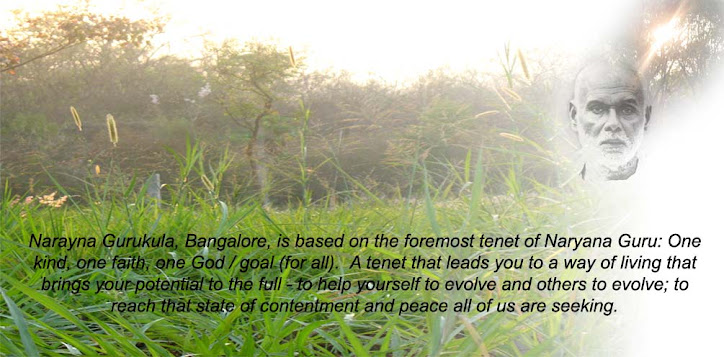The Gurukula hinges on the principle of providing space for one’s overall development, irrespective of the personal beliefs, provided theses beliefs don’t encroach or infringe upon someone else’s. The credo here is to give each one his or her private space but at the same time help learn from others what is good for oneself. This can be done most effectively by whole-heartedly participating, as far as possible, in all the activities with others at the Gurukula.
A day at the Gurukula
The day here starts at the auspicious hour known as Brahma Muhurta – at 4:30 am. This time of the day the entire world is at rest and you can draw in the pure energy of your environment which increasingly gets polluted as the day advances. This is the right time for an hour of private meditation or undisturbed contemplation. Right after this, is the coffee class (class combined with preparation of brunch) between 5.30 and 7:00. Seven to 8:30 you are involved with individual duties, and from 8:30 to 9:30you can catch up with your morning rituals, like your bath and such. Nine thirty to 10:30 is the time for collective prayer, meditation, discussion, etc. At 10:30 you can partake of the main meal of the day - the brunch. Brunch over, have rest for a short while or take up some activity according to your need and your ability. Your activity can be anything from tending cows, weeding the field, organizing the library, joining in some construction activity, learning writing, craft or art from professionals. Three is tea time. After three, it’s time for getting the dinner ready. At 4:00, you go for a walk, or chose some activity that suits your nature. Around 6:30 is the time for private meditation. At 7:00 is collective prayer for half an hour before your dinner that ends at 8:30. From then onwards it is entertainment time till you retire to bed at 9:30. Going to bed at this time after a whole day of activity would put you to sleep as if you were a new-born baby. Making you the next morning as fresh as the dew drops when you wake up at 4:30 after a refreshing sleep.
The Place
Narayana Gurukula of Bengaluru is at Bolare on Kanakapura Road and is about 25 Kilo meters from Banashankari. The place with its un-tampered nature lends itself to a serenity and peace which the first-time visitors will enjoy as long as they remain here.
When you reach the main building, you’ll be heartily welcomed by Ma, aka Margaret Chaitanya, present head of the place, if she is not engaged in some other activity; for she is so steeped in the upkeep of the Gurukula that her hands are, indeed, full till midnight.

Over a cup of coffee or tea, you learn to know something about the Gurukula. After that, you could leisurely amble around the place taking in the sounds of birds of different kind, patting cows in the shed, gaze at the rabbits in their comfortable cage or go into the library for some intellectual stimulation. If you’re not inclined to any of these but would like to engage someone in conversation to know about the philosophy and culture of the place, Ma or someone else will be at your command. Or, if you are one of those who cannot stay away from physical activity, get straight into a task that engages your interest and boost your energy.
The book house and the shrine
A unique book house is in the making where books of high moral, ethical and philosophical values will be displayed. You will be able to browse there at a leisurely pace, hold discussions with other people and listen to readings. In short, this will be a kind of salone that Paris was famous for, where like-minded people exchanged their views and interacted intellectually.
There is a shrine close by the book house where you can sit and meditate. There is no idol here. There is only a mirror that reflects you - symbolically telling you to reflect on your nature or the life you have led till now.
Not a resort, but a retreat
The ambience of the pace is such that one may be deceived into believing that the Gurukula could be used as a resort. Nothing could be farther from the truth. The place is for those, and only those, who would like to get away from the hurly burly of a hectic life and spend some moments and days to regain one’s mental equilibrium and peace to lead a life of maximum potential. In other words, an incomparable retreat.



